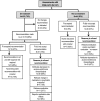Acceptance of Antidepressant Treatment by Patients on Hemodialysis and Their Renal Providers
- PMID: 28126707
- PMCID: PMC5293340
- DOI: 10.2215/CJN.07720716
Acceptance of Antidepressant Treatment by Patients on Hemodialysis and Their Renal Providers
Abstract
Background and objectives: Depression is common in patients receiving chronic hemodialysis but seems to be ineffectively treated. We investigated the acceptance of antidepressant treatment by patients on chronic hemodialysis and their renal providers.
Design, setting, participants, & measurements: As part of a clinical trial of symptom management in patients on chronic hemodialysis conducted from 2009 to 2011, we assessed depression monthly using the Patient Health Questionnaire 9. For depressed patients (Patient Health Questionnaire 9 score ≥10), trained nurses generated treatment recommendations and helped implement therapy if patients and providers accepted the recommendations. We assessed patients' acceptance of recommendations, reasons for refusal, and provider willingness to implement antidepressant therapy. We analyzed data at the level of the monthly assessment.
Results: Of 101 patients followed for ≤12 months, 39 met criteria for depression (Patient Health Questionnaire 9 score ≥10 on one or more assessments). These 39 patients had depression on 147 of 373 (39%) monthly assessments. At 103 of these 147 (70%) assessments, patients were receiving antidepressant therapy, and at 51 of 70 (70%) assessments, patients did not accept nurses' recommendations to intensify treatment. At 44 assessments, patients with depression were not receiving antidepressant therapy, and in 40 (91%) instances, they did not accept recommendations to start treatment. The primary reason that patients refused the recommendations was attribution of their depression to an acute event, chronic illness, or dialysis (57%). In 11 of 18 (61%) instances in which patients accepted the recommendation, renal providers were unwilling to provide treatment.
Conclusions: Patients on chronic hemodialysis with depression are frequently not interested in modifying or initiating antidepressant treatment, commonly attributing their depression to a recent acute event, chronic illness, or dialysis. Renal providers are often unwilling to modify or initiate antidepressant therapy. Future efforts to improve depression management will need to address these patient- and provider-level obstacles to providing such care.
Keywords: Chronic Disease; Depressive Disorder; Disease Management; Fluid Therapy; Humans; Nurses; Surveys and Questionnaires; acceptance; anti-depressant therapy; depression; hemodialysis; psychological; quality of life; renal dialysis; symptoms; treatment.
Copyright © 2017 by the American Society of Nephrology.
Figures
Comment in
-
We Need to Talk about Depression and Dialysis: but What Questions Should We Ask, and Does Anyone Know the Answers?Clin J Am Soc Nephrol. 2017 Feb 7;12(2):222-224. doi: 10.2215/CJN.13031216. Epub 2017 Jan 26. Clin J Am Soc Nephrol. 2017. PMID: 28126705 Free PMC article. No abstract available.
References
-
- Kimmel PL, Cukor D, Cohen SD, Peterson RA: Depression in end-stage renal disease patients: A critical review. Adv Chronic Kidney Dis 14: 328–334, 2007 - PubMed
-
- Lopes AA, Bragg J, Young E, Goodkin D, Mapes D, Combe C, Piera L, Held P, Gillespie B, Port FK; Dialysis Outcomes and Practice Patterns Study (DOPPS) : Depression as a predictor of mortality and hospitalization among hemodialysis patients in the United States and Europe. Kidney Int 62: 199–207, 2002 - PubMed
-
- Watnick S, Kirwin P, Mahnensmith R, Concato J: The prevalence and treatment of depression among patients starting dialysis. Am J Kidney Dis 41: 105–110, 2003 - PubMed
-
- Watnick S, Wang PL, Demadura T, Ganzini L: Validation of 2 depression screening tools in dialysis patients. Am J Kidney Dis 46: 919–924, 2005 - PubMed
Publication types
MeSH terms
Substances
LinkOut - more resources
Full Text Sources
Other Literature Sources
Medical
Research Materials
Miscellaneous


